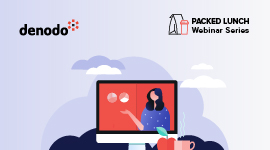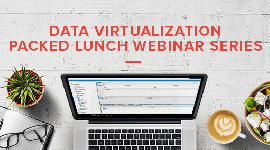Have a question?
Sessions

Thursday, August 24, 2023 11:00am PDT / 2:00pm EDT
Tackling Data Risks Head-On: The Potential of Data Virtualization
In the face of growing data breaches, mitigating risks is paramount for any organization. This webinar explores how data virtualization, which offers a real-time, unified view of dispersed data, can help navigate these challenges. With insights from key reports, we underline the pivotal role of data virtualization in enhancing data security and regulatory compliance. Moreover, we delve into its ability to eliminate data silos, fostering improved collaboration and decision-making, and ensuring business continuity.

Thursday, June 15, 2023 11:00am PDT / 2:00pm EDT
Is Data Mesh or Data Fabric in Your Future? Prerequisites for Success
In the era of data-driven decisions, how you manage and utilize your data is a critical determinant of your business's success. Understanding whether a Data Mesh or Data Fabric is suitable for you can revolutionize your data strategy, sparking innovation and providing you with the insights to drive your business forward.

Thursday, April 20, 2023 11:00am PDT / 2:00pm EDT
Three Strategies for Building an Agile and Adaptable Data Architecture
With the rapidly changing business landscape, growing data volumes and complexity, and the emergence of new technologies and data sources, an agile data architecture is crucial for a company's success. It enables data-driven decision-making, enhances data security and governance, and improves team collaboration and efficiency. The question many have is how to build this agile data architecture.

Thursday, February 23, 2023 11:00 am PST / 2:00 pm EST
Building the Foundation of a Modern Data Architecture
Traditional Data Management approaches that rely on collecting data within a centralized data store, such as a cloud data warehouse or data lake, are core building blocks for your data modernization efforts. However, you need more to address the diverse needs of today's businesses. Hybrid/Multi-cloud, SaaS, and data privacy laws are just a few examples of why data will remain distributed.

Thursday, November 17, 2022 11:00 am PT | 2:00 pm ET
Cloud Migration Strategies that Ensure Greater Value for the Business
The cloud is no longer the future; the cloud is now. Companies continue to shift their workloads and data to the cloud to leverage the speed, agility, and efficient scalability the cloud offers. As a result, there is increasing attention given to cloud-based data warehouses, data lakes, and lake houses as a way for organizations to simplify managing their ever-increasing volumes of data. However, many find that these new technologies only complicate the data management process.

Thursday, October 20, 2022 11:00 AM PT | 2:00 PM ET
Shaping the Role of a Data Lake in a Modern Data Fabric Architecture
Data lakes have been both praised and loathed. They can be incredibly useful to an organization, but it can also be the source of major headaches. Its ease to scale storage with minimal cost has opened the door to many new solutions, but also to a proliferation of runaway objects that have coined the term data swamp.
However, the addition of an MPP engine, based on Presto, to Denodo’s logical layer can change the way you think about the role of the data lake in your overall data strategy.
Watch on-demand this session to learn:

Thursday, September 15, 2022 11:00 am PDT | 2:00 pm EDT
The Role of the AI Powered Denodo Recommendations Engine in a Data Marketplace
Today we are seeing the evolution of organizations becoming more and more data centric. This has given rise to the need to provide data citizens with easy access to fully governed data marketplaces. In this webinar, we will hear from Denodo subject matter experts on the role of the AI powered Denodo recommendations engine in providing easy access to your enterprise data to assist with better decision making. We will also hear from industry expert Sherlock Holmes from Genware Computer Systems on his experiences in data marketplaces.
Watch On-Demand and Learn:

Thursday, August 18, 2022 11:00 am PDT | 2:00 pm EDT
Overcoming Data Management Challenges in AI/ML
The ever-growing data landscape drives initiatives to automate many aspects of the analytics lifecycle; such as data access, enablement of semantics, BI and others. Automation has become an integral part of our daily lives in the enterprise data fabric. The AI-driven initiative to automate the data access and provide guidance to the right data assets, correlates with the initiatives of the data scientists to get access to more curated data.
In this session we will discuss:

Thursday, July 21, 2022 11:00 am PDT | 2:00 pm EDT
Logical Data Fabric vs Data Mesh. Does it Matter?
Data Fabric and Data Mesh had been trending high in the data and analytics space, so what is a data fabric and what is a data mesh? How are they different and does it matter?
In this session, Ravi Shankar, Sr. VP and CMO at Denodo, will address the market and analyst views of these two approaches and how they complement each other. His presentation will be followed by an insightful and engaging fireside chat with Mark L Johnson, Executive Director, Client Solutions at Fusion Alliance to further discuss what it all means in terms of value to the customer.

Thursday, June 16, 2022 11:00 am PDT / 2:00 pm EDT
Adopting a Logical Data Architecture for Today's Data and Analytics Requirements
It’s almost impossible to find any organization that does not have data and analytics as one of their top priorities to further their business objectives. At the same time the data and analytics landscape is evolving faster than ever, making the data management ecosystem more complex than ever before. As data gets increasingly distributed across systems and locations, every forward looking organization should adopt a logical architecture to be future ready.
Watch On-Demand and Learn:

Thursday, May 19, 2022 11:00 am PDT | 2:00 pm EDT
Achieving Self-service Analytics with a Governed Data Services Layer
We all heard about Self-Service initiatives, or maybe even implementing one. With the evolution of data landscape we have become data driven, when we should be information driven. Data without context lacks meaning. Data meaning is what drives the valuable business insights. We need to drive our consumers to the right information, while providing guided and governed experience across diverse consumer community.
Attend and Learn:
- What it takes to make Self-Service initiatives successful
- How Governed Data Service Layer enables guided data discovery

Thursday, April 21, 2022 11:00 am PDT / 2:00 pm EST
How Semantics Simplifies Data Sharing at an Enterprise Level
Semantics has been a topic often associated with academia with little impact in the analytics world. However, that tendency is starting to change, fueled by self-service and data democratization initiatives that broaden the scope of who’s accessing data and what those users expect.

Thursday, March 03, 2022 11:00 AM PT
Data Lakes: A Logical Approach for Faster Unified Insights
Data lakes and data warehouses offer organizations centralized data delivery platforms. The recent Building the Unified Data Warehouse and Data Lake report by leading industry analysts TDWI we discovered 64% of organizations stated the objective for a unified Data Warehouse and Data Lakes is to get more business value and that 84% of organizations polled felt that a unified approach to Data Warehouses and Data Lakes was either extremely or moderately important.

Thursday, November 18, 2021 11:00 AM PT
The Role of the Logical Data Fabric in a Unified Platform for Modern Analytics
Given the growing demand for analytics and the need for organizations to advance beyond dashboards to self-service analytics and more sophisticated algorithms like machine learning (ML), enterprises are moving towards a unified environment for data and analytics. What is the best approach to accomplish this unification?

Thursday, August 19, 2021
Augmentation, Collaboration, Governance: Defining the Future of Self-Service BI
According to Dresner Advisory’s 2020 Self-Service Business Intelligence Market Study, 62% of the responding organizations say self-service BI is critical for their business. If we look deeper into the need for today’s self-service BI, it’s beyond some Executives and Business Users being enabled by IT for self-service dashboarding or report generation. Predictive analytics, self-service data preparation, collaborative data exploration are all different facets of new generation self-service BI.

Thursday, July 15, 2021 11:00 AM PT / 2:00 PM ET
Logical Data Fabric for Building a Unified Data Warehouse and Data Lake
Why a logical data fabric is the cornerstone to Building a Unified Data Warehouse and Data Lake
Thursday, June 17, 2021 11:00 AM PT / 2:00 PM ET
Bringing a real time flavor to your enterprise analytics
Real time analytics techniques promise to enrich your traditional analytics with real time data points. It's key for many scenarios like supply chain management or customer care. Data Virtualization is well known for offering real time connectivity to diverse sources and federation capabilities: the two base ingredients for real time analytics. However, building a strategy around these concepts can be challenging. Impacting delicate data sources, security and performance concerns are often mentioned.
Attend this session to learn more about:

Thursday, May 20, 2021 11:00 AM PT / 2:00 PM ET
Data Driven Insights via Cloud Data Integration
Businesses have benefited greatly from the ability to combine all of their cloud applications as well as on-premises systems. Migrating workloads to the cloud has led to increased cloud adoption while business leaders are realizing their digital cloud transformation has the potential to unlock their data in extraordinary ways. Data driven insights and strategies help ensure that cloud data integration can enable the platform modernization initiatives in your organization.
Attend & Learn:

Thursday, April 15, 2021 11:00 am PT / 2:00 pm ET
Physical or Logical Data Fabric: Which One to Use and When?
What is a data fabric? Gartner defines it as “one architecture that can address the extreme levels of diversity, distribution, scale and complexity in organizations’ data assets that are adding tremendous complexity to the overall data integration and data management design.” But do you know that data fabric can be logical or physical? What’s the difference? Which one to use and when?
Watch on-demand this webinar and find out:

Thursday, March 18, 2021 11:00 am PT / 2:00 pm ET
Data Services and the Modern Data Ecosystem
Digital Transformation has changed IT the way information services are delivered. The pace of business engagement, the rise of Digital IT (formerly known as “Shadow IT), has also increased demands on IT, especially in the area of Data Management.
Data Services exploits widely adopted interoperability standards, providing a strong framework for information exchange but also has enabled a growth of robust systems of engagement that can now exploit information that was normally locked away in some internal silo with Data Virtualization.

Thursday, December 17, 2020 11:00 a.m. PST / 2:00 p.m. EST
Denodo’s Data Catalog: Bridging the Gap between Data and Business
Self service is a major goal of modern data strategists. Denodo’s data catalog is a key piece in Denodo’s portfolio to bridge the gap between the technical data infrastructure and business users. It provides documentation, search, governance and collaboration capabilities, and data exploration wizards. It’s the perfect companion for a virtual layer to fully empower those self service initiatives with minimal IT intervention. It provides business users with the tool to generate their own insights with proper security, governance and guardrails.
In this session we will see:

Thursday, November 19, 2020 11:00 AM PT / 2:00 PM ET
ROI and Economic Value of Data Virtualization
Gartner has predicted that organizations using Data Virtualization will spend 40% less on data integration than those using traditional technologies. Denodo customers have experienced time-to-deliver improvements of up to 90% within their data provisioning processes and cost savings of 50% or more. Join us for this webinar to discover how Data Virtualization can help accelerate your time-to-value from data while reducing the costs at the same time. As Rod Tidwell (Cuba Gooding Jr.) said in the movie 'Jerry Maguire', "Show me the money!"

Thursday, March 21, 2019 11.00 am PT
Accelerate Migration to the Cloud using Data Virtualization
Organizations are adopting cloud at a fast pace and migration of critical enterprise information resources could be a challenge when dealing with complex and big data landscape.Denodo Free Trial
30-days free trial on the cloud for you to fully test Denodo Professional
START FREE TRIAL
Thursday, November 02, 2023 11:00am PDT / 2:00pm EDT
Mastering Cloud Data Cost Control: A FinOps Approach
With the rise of cloud-first initiatives and pay-per-use systems, forecasting IT costs has become a challenge. It's easy to start small, but it's equally easy to get skyrocketing bills with little warning. FinOps is a discipline that tries to tackle these issues, by providing the framework to understand and optimize cloud costs in a more controlled manner. The Denodo Platform, being a middleware layer in charge of global data delivery, sits in a privileged position not only to help us understand where costs are coming from, but also to take action, manage, and reduce them.